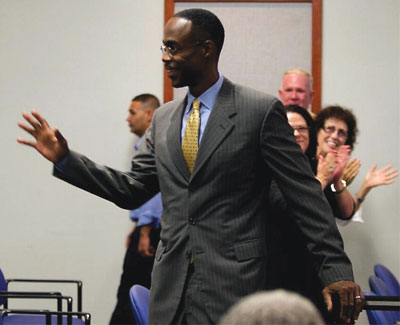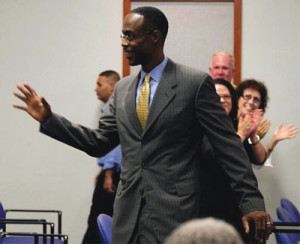

(Joe Rimkus Jr., Miami Herald file photo)
Broward Schools to sue over controversial new schools law
By Kirsten M. Clark
Herald/Times Tallahassee Bureau
The bitter fight over new K-12 public school reforms that the Republican-led Legislature approved this spring entered a new stage on Wednesday when the Broward County School Board voted unanimously to challenge the law’s constitutionality in court.
Broward is the first school district to vote to sue over the passage of House Bill 7069, which became law Saturday above passionate objections from school administrators, teachers’ unions, and parent groups statewide for its many provisions friendly to charter schools. In some cases, at the expense of traditional public schools.
“I’m in favor of taking aggressive action as soon as we possibly can,” Broward School Board member Rosalind Osgood said during a special board meeting convened solely to authorize Superintendent Robert Runcie to file the legal challenge and to spend up to $25,000 on initial legal fees.
“We’re on life support now, and we have to literally fight for the life of public education in this state,” Osgood said. “If we don’t stand up now, if we miss this opportunity, we’ll never recover from it.”
It’s unclear how soon the lawsuit will be filed.
Broward County’s allegations of unconstitutionality primarily surround how HB 7069 gives charter schools a leg up over traditional public schools through less restrictive regulations and extra taxpayer funding that make it easier for them to expand.
Most troublesome to Broward and other school districts is a provision that forces them to share with privately managed charter schools millions in local tax dollars earmarked for construction and maintenance. In 2017-18 alone, Broward could have to share up to $12 million with its charters, while Miami-Dade County Public Schools will have to share as much as $23.2 million, according to data compiled by the Florida House. Over five years, that will cost Miami-Dade schools $250 million, the district predicts.
MORE: “Here’s how the controversial new schools law will impact South Florida”
The Broward school district alleges that provision and several others in HB 7069 violate various sections of the Florida Constitution, which requires the state to provide “a uniform, efficient, safe, secure and high-quality system of free public schools.”
In a memo to board members this week, Broward Schools’ general counsel Barbara Myrick laid out the district’s initial legal argument, including that HB 7069 unconstitutionally restricts local school boards’ authority to “operate, control and supervise” the schools within their district.
Charter schools are public schools but they are privately managed by outside entities — some of them for-profit operators — that are beyond the purview of locally elected school boards.
Broward Schools also takes direct issue with the new “Schools of Hope” program set up under HB 7069, which is intended to address perpetually failing public schools primarily by providing financial incentives to charter operators so they can directly compete with struggling traditional schools.
Myrick argued in her memo that the program “circumvents the direct involvement of the school board in charter school contracting,” prevents the district from having any say over those schools and “establishes a duplicative competitive private system.”
The “Schools of Hope” program provides only 25 of more than 100 perpetually failing traditional schools the chance to receive as much as $2,000 per student to pay for wraparound services, like after-school programs. At most, that aid would total about $44.5 million, a Herald/Times analysis previously found.
Meanwhile, more than double that — $95.5 million — would be available to specialized charter operators to set up schools within 5 miles of any struggling traditional school, so as to provide students with another educational option.
In a statement to the Herald/Times, House Speaker Richard Corcoran, R-Land O’Lakes, blasted the Broward School Board for its decision. Passing “Schools of Hope” was a top priority for him, as was crafting HB 7069 the way it was in the final days of the session.
“This is another example of the educational bureaucracy putting the adults who administer the schools ahead of the children who attend the schools,” Corcoran said.
“Not only is it clueless, it is also arguably heartless, to sue to stop school children from getting recess, disabled children from getting funding, poor children from getting out of failure factories and teachers from getting more pay,” he added, referencing other provisions in the wide-ranging legislation.
As Broward administrators prepare to sue, the school district plans to garner support from other school districts that might want to join in, district spokeswoman Tracy Clark said.
It’s unclear yet which ones those might be, but Miami-Dade County Public Schools — another outspoken opponent of HB 7069 — is a possible ally.
The Miami-Dade School Board voted two weeks ago to have its attorney prepare a report “with any legal options available in response to HB 7069” before this Thursday, when the board’s committees meet.
While the Miami-Dade board weighs those possibilities, Superintendent Alberto Carvalho said he simultaneously wants to talk with state officials and lawmakers to see if and how the district’s concerns can be addressed.
“We’re going to engage in very, very aggressive conversations with the Department of Education entities and also legislative leaders to convey the true impact — which may, in some instances, exceed what was calculated — and attempt to explore that route before any of the other possible options are considered,” Carvalho said. “This would not be the first time that decisions were made in Tallahassee and then a subsequent dialogue … resulted in conversations with legislators and some mitigation to policy decisions that had been made.”
“This is difficult and complex,” he added. “That’s one of the inherent dangers with the last-minute decision-making process without considering all of the unanticipated consequences, the collateral impact. I think we’re seeing that now.”
Miami-Dade schools chief Alberto Carvalho, with School Board members, announces that no school received an F.
HB 7069 drew intense opposition almost immediately after House and Senate leaders unveiled it late on a Friday in early May, three days before lawmakers had to vote on it as part of the 2017-18 budget package with no opportunity to amend it.
The 274-page bill gleaned proposals from at least 55 House and Senate bills filed during the 2017 session, as well as language never before discussed or considered publicly or — in one case — that was already defeated by a Senate committee.
Its other major provisions include bonuses for top teachers, some efforts to reduce standardized testing, an expansion of a voucher-like program that helps students with disabilities, and changes to how federal Title I dollars are disbursed among school districts and their local charter schools.
The legislation easily passed the House — key Republicans there helped craft the bill and the party holds a strong majority in that chamber — but it barely cleared the Senate, passing 20-18.
School district superintendents, teachers unions and parent groups mounted a passionate campaign urging Gov. Rick Scott to veto the bill, which was countered by school choice advocates’ demands that it be signed.
Scott approved the new law on June 15 — reportedly as part of a deal that included the Legislature passing Scott’s top priorities of additional job and tourism funding during a special session the previous week.
At least three lawmakers were in attendance for the Broward School Board’s vote Wednesday, according to the Broward Legislative Delegation: Democratic Reps. Bobby Dubose of Fort Lauderdale, Patricia Williams of Lauderdale Lakes and Joe Geller of Aventura. All three opposed HB 7069.
Geller, who also represents part of northeast Miami-Dade County, tweeted his support for the school district’s lawsuit.
I support @browardschools to challenge the constitutionality of #HB7069 by filing legal action with other School Dis-tricts. @BrowardLegDelpic.twitter.com/skxPXPoCKR
Joseph Geller (@RepJosephGeller) andKristen M. Clark: (850) 222- 3095, kclark@miamiherald.com, @ByKristenMClark


Be the first to comment